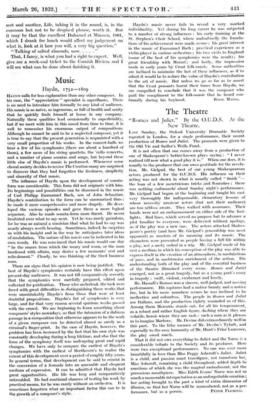Music
Haydn, 1732-1809
Hasirns calls for less explanation than any other composer. In his case, the " appreciation " specialist is superfluous. There is no need to introduce him formally to any kind of audience. His music is so naive, so ingenuous, so full of health and sanity that he quickly finds himself at home in any company. Naturally these qualities lead occasionally to superficiality, but if we meet with him in this mood from time to time, it is well to remember his enormous output of compositions. Although he cannot be said to be a neglected composer, yet it is true to say that the present generation is acquainted with a very small proportion of his works. In the concert-halls we hear a few of his symphonies (there are about a hundred of them), a few more of his string quartets, the 'cello concerto, and a number of piano sonatas and songs, but beyond these little else of Haydn's music is performed. Whenever some choral society decides to revive The Creation many are surprised to diseover that they had forgotten the freshness, simplicity and sincerity of that music.
The influence of Haydn upon the development of sonata- form was considerable. This form did not originate with him. Its beginnings and possibilities can be discerned in the music of Carl Philipp Emmanuel Bach, son of John Sebastian. Haydn's contribution to the form can be summarised thus : he made it more comprehensive and more shapely. He deve- loped the various episodes and gave them a more logical sequence. Also he made sonata-form more fluent. He never hesitated over what to say next. Yet he was rarely garrulous, for he'was sa natural a musician that what he had to say was nearly always worth hearing. Sometimes, indeed, he surprises us with his insight and in the way he anticipates later ideas of modulation. The nature of his music can be indicated in his own words. He was convinced that his music would one day " be the source from which the weary and worn, or the man burdened with affairs, may derive a few moments' rest and refreshment." Clearly, he was thinking of the tired business
There are signs that his opinion is now being justified. The best of Haydn's symphonies certainly have this effect upon present-day audiences. It was not till comparatively recently that the symphonies were carefully prepared, edited and collected for publication. Those who undertook the task were faced with great difficulties in distinguishing those works that were unmistakably Haydn's from those that were at least doubtful propositions. Haydn's list of symphonies is very large, and for that very reason several spurious works passed with the crowd: We are beginning to learn something about composers' styles nowadays, so that the intrusion of a dubious passage in a composition that otherwise appears to be the work of a given composer can be detected almost as surely as a criminal's finger-print. In the ease of Haydn, however, the problem has been increased by the fact that his own style was constantly developing during a long lifetime, and also that the form of the symphony itself was undergoing great and rapid changes. We have only to compare the earliest of Haydn's symphonies with the earliest of Beethoven's to realise the extent of this development over a period of roughly fifty years. In general terms, that development can be said to consist in the conversion of a formula into an amenable and eloquent medium of expression. It can be adMitted that Haydn had great opportunities. His life was long and comparatively untroubled. He hid continual chances of testing his work by practical means, for he was rarely without an orchestra. It is sometimes forgotten what an important factor this can be in the growth of a composer's style.. Haydn's music never faits to reveal a very marked individuality. Yet during his long career he was subjected to a number of strong influences : his early training at the St. Stephen's Choir School, where undoubtedly the founda- tions of his achievement were made secure ; his great interest in the music of Emmanuel Bach ; practical experience a.4 violin-player in various orchestras ; his two visits to England (some of the best of his symphonies were the result) ; his great friendship with Mozart; and lastly, the impression made in early years by Croat folk-music. Some authorities are inclined to minimize the last of these influences, as if to admit it would be to reduce the value of Haydn's contribution to the art of music. But unless we go so far as to assert that the Croat peasants learnt their tunes from Haydn, we are compelled to conclude that it was the composer who paid the compliment to the folk-music that he heard con-
tinually during his boylmod. lissu. Mama:.


































 Previous page
Previous page